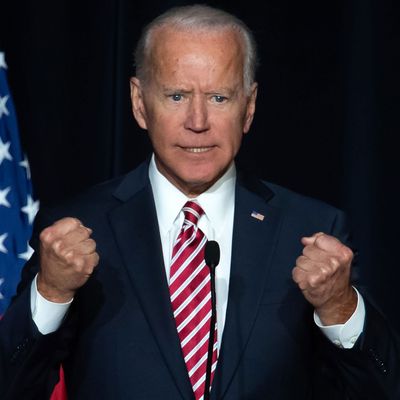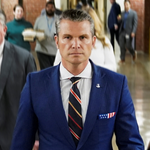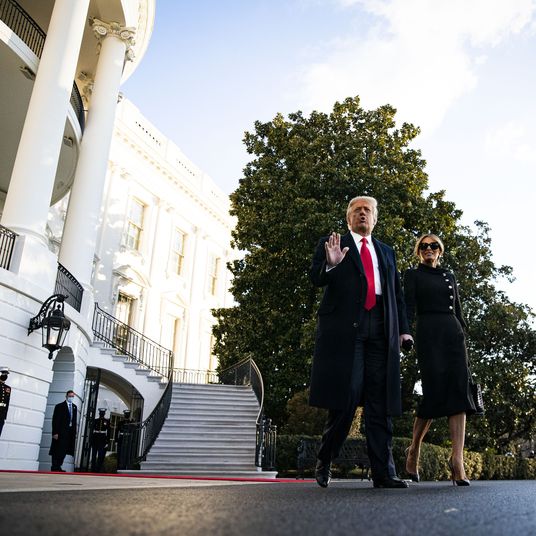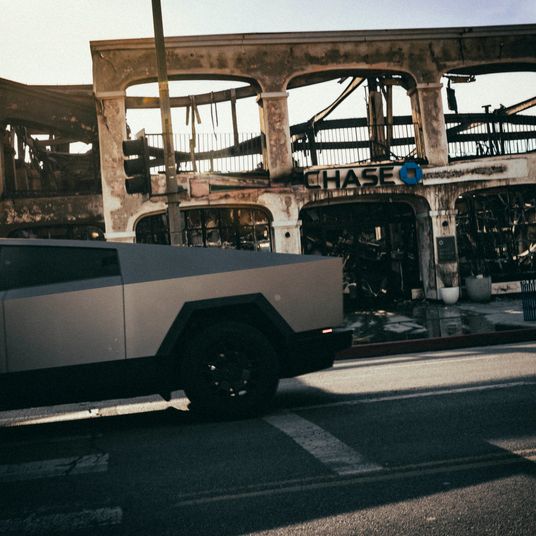
Most weeks, New York Magazine writer-at-large Frank Rich speaks with contributor Alex Carp about the biggest stories in politics and culture. Today, the Trump and Biden’s Iowa face-off, Democrats’ failed hearing on the Mueller report, and how to moderate the first DNC debate.
After weeks of sniping at each other from long distance, both Donald Trump and Joe Biden spent yesterday going head-to-head in Iowa, providing the framing that each of them seems to prefer on the road to 2020. Is it a mistake for either of them to look past a challenge from the rest of the Democratic field?
Yes, for both. I have no idea who is going to be the Democratic nominee, but I don’t think it’s going to be Biden. One of the several reasons is that by focusing solely on Trump 17 months before Election Day and refusing to engage with any of his Democratic opponents, he is disrespecting not just those opponents but the majority of voters in his own party. He looked presumptuous when he blew off an Iowa event with 19 other Democratic candidates over the weekend, no matter how commendable his excuse (a grandchild’s high-school graduation). In a party where every major politician (and presidential candidate) is fiercely anti-Trump, Biden isn’t even the most clever at goading him. Nancy Pelosi is the gold standard, with Pete Buttigieg and Elizabeth Warren coming up strong.
Biden leads in the polls but not by so much so that he can act like Trump’s anointed opponent. As James Hohmann of the Washington Post pointed out, in the new Des Moines Register poll, where Biden’s trajectory has started to drop, he leads the Democratic field by being the first choice of 24 percent of Iowa’s likely Democratic caucusgoers — as opposed to 57 percent for Clinton in the same poll four years ago. Only 29 percent of his supporters are “extremely enthusiastic” about him. Biden’s recent whiplash reversal on his decades-long support for the Hyde Amendment restricting abortion rights suggests that there will be further hits on that enthusiasm to come. It wasn’t just the politically clumsy flip-flopping that was the problem, but the lack of transparency about how it happened. His stance is “I am anti-Trump gladiator No. 1, so what else do you need to know?”
As for Trump, he is making the mistake of refighting the last war. He is lazy, and by assuming that he’ll face Biden, an Establishment party figure, he’s betting that he can recycle his Jeb Bush–Hillary Clinton playbook from four years ago. Indeed, he’s already smearing Biden’s energy (“he’s even slower than he used to be”) and health (also a big Fox News smear campaign), as he did, respectively, with those 2016 opponents. That he was so at a loss for a nickname for Buttigieg that he likened him to Alfred E. Neuman is an indicator of how his cultural antennae have atrophied with age since his prime-time heyday in The Apprentice. Unless he’s facing a fellow septuagenarian he’s likely to be off his very limited game. Presidents are always isolated from reality in the White House bubble but none ever to the degree of Trump. Mar-a-Lago is his idea of getting out among the folks.
My favorite news story of the past week is the Times’ report that Trump refuses to believe the polls of his own internal pollster, the Republican veteran Tony Fabrizio, because they are downbeat, and is instructing his toadies to ignore or lie about them. He’s adding “fake polls” to his “fake news” repertoire. Trump is no Hitler but his determined ignorance of reality is good news for Democrats, much as Hitler’s ignorance of setbacks in the war was good news for the Allies.
This week, the new Quinnipiac poll shows Trump losing not only to Biden but every other Democrat selected for a matchup, down to Cory Booker. No matter who the opponent, and no matter how wide the gap with a Democrat, the Trump result remains the same: He never rises above 42 percent, which is the exact average of his approval ratings in all legitimate polls according to FiveThirtyEight. In a new Morning Consult survey, Trump is frozen at 32–33 percent, essentially the GOP base, no matter what Democrat is test-matched against him.
Meanwhile the Trump–Biden split-screen duel in Iowa is fun in its way, given that Walter Matthau and Jack Lemmon are unavailable to make any more sequels to Grumpy Old Men. But will we remember any of it, even a month from now? It’s a measure of how early we are in the electoral calendar that, except when the most familiar Democratic candidates, Biden and Bernie Sanders, are pitted against Trump in the Morning Consult poll, Trump and the Democratic competitor alike lose to “Don’t know.”
As John Dean’s Monday testimony on the Mueller report has failed to make a splash, a rift in the Democratic Party has begun to emerge between Jerry Nadler, who is pushing for a formal impeachment inquiry, and Nancy Pelosi, who says the effort lacks broader party support. Is a formal inquiry the only way to get America’s attention?
Here’s all you need to know about getting America’s attention for the Mueller report. The experts called upon by the Democrats to educate the public about the report and its Watergate antecedents on Monday are under contract as commentators to CNN (Dean) and MSNBC (the former prosecutors Joyce Vance and Barbara McQuade). And yet even CNN and MSNBC didn’t bother to air the hearing, choosing instead to chase at length the bright object of the moment, the helicopter that crash-landed in the fog on a Manhattan office tower. If you wanted to hear from Dean, et al., you had to find it on C-Span 3. To quote the president of the United States: Sad!
Also factor into the general apathy the reality that few Americans (and apparently not that many members of Congress) have read the Mueller report, that Robert Mueller’s odd press appearance did nothing to whip up a public hunger for it, and that William Barr’s Department of Justice is sinisterly gifted at throwing monkey wrenches in the congressional investigative process. All of this argues that the only way that Americans will focus on Trump’s bottomless corruption and countless transgressions against the law is if there are hearings given the marquee imprimatur of Impeachment.
Fair enough, but to what end? As long as the Vichy Republicans hold firm — and, I’m sorry, the anti-Trump rebellion of a single iconoclastic GOP house member, Justin Amash, is a one-off, not a harbinger of a larger revolt — an impeached Trump will be acquitted in the Senate. And acquitted on the eve of the 2020 Election, handing him another bogus badge of “exoneration.” Or how about this for a nightmare scenario: Mitch McConnell will so successfully gum up and otherwise manipulate an impeachment trial in the Senate that it will still be going on, sucking up oxygen from the Democratic ticket (and Democratic congressional candidates) and churning up Trump’s base, when Americans go to the polls. I am still with Pelosi on this: Let all the Trump investigations roll forward, including those in non-congressional venues like the Southern District of New York. Keep digging for new evidence. Know that there are non-impeachment remedies under the law, including those that might satisfy Pelosi’s wish of seeing Trump “in prison,” that will come into play the moment Trump no longer enjoys the Oval Office immunity that Mueller invoked in punting on the obstruction charges in his report.
NBC has announced that the first Democratic debate, scheduled for two nights later this month, will have five moderators — Lester Holt, Savannah Guthrie, José Diaz-Balart, Chuck Todd, and Rachel Maddow — and as many as 20 candidates. What can they do to help sort out the huge Democratic field?
Nothing. Do the math. Each candidate will get 12 minutes — but really not that much when you factor in breaks all the “production” that will be ladled on top each night, from fulsome introductions of each of the 20 to lengthy explanations of the arbitrary, ever-shifting, Rube Goldberg–esque Democratic National Committee rules that govern this spectacle. One might argue that the old Miss America pageant’s recitation of the competitors’ public-service “platforms” would have greater substance than this lightning round of over-rehearsed soundbites.
Meanwhile, what exactly is NBC adding to the mix? The network’s goal seems to be branding — not only are the moderators scrupulously chosen for racial and gender diversity but also to give equal play to the Today show, the network’s Nightly News, and its cable outlet, MSNBC. Surely we’d get more of the candidates and less show-business marketing if there were a single well-versed moderator each night, chosen for his or her ability to move things along, rather than for showing off the network’s wares. I nominate Alex Trebek. What candidate would say no to him, and what viewer wouldn’t tune in for him? A Canadian-born game-show host may be just the ticket to make American political debates great again.






























